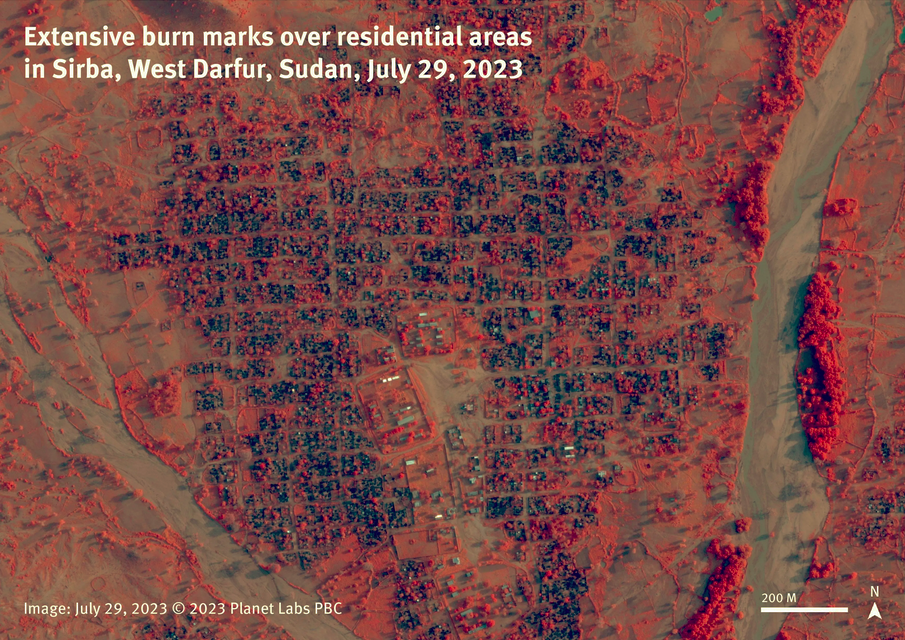REDRESS: Mounting evidence of war crimes in Sudan

Infrared satellite image taken on July 29 shows residential areas of Sirba, West Darfur, affected by burning. On infrared images, the vegetation appears in red and the burned areas more clearly in a darker colour. (Source: Planet Labs PBC)
The UK-based REDRESS organisation and the SOAS Centre for Human Rights Law have reported that “a large body of credible (and evolving) evidence” is emerging implicating both sides of the war in Sudan “in the commission of serious human rights abuses and possible war crimes.”
In the co-autored report entitled Ruining a country, devastating its people. Accountability for serious violations of international human rights and humanitarian law in Sudan since 15 April 2023, REDRESS and the SOAS Centre for Human Rights Law note that there are “reasonable grounds to conclude that some of the patterns of violations being reported in Sudan constitute crimes against humanity. there are also credible accounts of conduct in Darfur that could possibly amount to genocide.”
Battles between the Sudan Armed Forces (SAF) and the Rapid Support Forces (RSF) in the vicinity of El Shajara Armoured Corps in western Khartoum and Omdurman continue to be reported, along with clashes in Darfur, Kordofan, and other parts of Sudan. The UN Office for the Coordination of Humanitarian Affairs (OCHA) in Sudan reported that as of September 5, about 5.1 million people have fled their homes since the war erupted in mid-April.
The report states that there is a large body of credible prima facie evidence implicating both the RSF and SAF in serious human rights abuses and possible war crimes, including mass arbitrary detention, torture, enforced disappearance, rape and other sexual and gender-based violence, intentionally targeting civilians and protected objects, and hostage-taking.
In addition, the use of scorched earth tactics in Darfur by the RSF may constitute crimes against humanity. “There is strong evidence that these attacks have been deliberately targeted against the Masalit and other non-Arab groups,” said REDRESS. A Human Rights Watch report, published on August 4, said that Sirba “is the seventh village or town that has been nearly destroyed or burned completely to the ground in West Darfur since April,” including Habila, Mistri, Morni, and Megmari.
At the time, an Amnesty International report documented mass civilian casualties “in both deliberate and indiscriminate attacks by the warring parties.” The report also detailed “sexual violence against women and girls, targeted attacks on civilian objects such as hospitals and churches, and extensive looting.”
The “spiralling violence” in Darfur “is raising the spectre of the scorched earth campaign of previous decades, at times involving some of the same actors,” said Amnesty International’s Secretary General Agnès Callamard on August 3.
According to REDRESS, the RSF and SAF hold an estimated 5,000 and 1,500 civilian detainees respectively, with reports of torture and ill-treatment being inflicted. “The RSF are also implicated in numerous hostage-taking cases and appear to have intentionally occupied civilian-populated buildings as a means of trying to prevent its forces from being targeted by the SAF.”
At least 108 cases of rape and other sexual and gender-based violence, particularly in Khartoum and Darfur, have been reported by Sudan’s Combating Violence Against Women Unit. “The Unit estimates that the cases it has registered likely represent approximately 2% of actual numbers,” according to REDRESS.
“There are various ongoing mediation initiatives, each attempting to broker some form of comprehensive ceasefire,” said REDRESS. “However, there is currently no clear end in sight. Behind the rhetoric of the two forces, atrocities continue to be reported daily. As both sides are seemingly convinced of their respective paths to victory, neither has made a meaningful public commitment to withdraw its troops from residential areas. With States and regional bodies taking regular stock of the leverage that they can feasibly deploy to resolve the impasse, a solution is urgently needed.”











 and then
and then